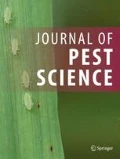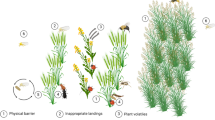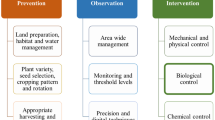Abstract
Nitrogen fertilizers are widely used to maximize crop productivity but are also known to benefit pest insects. Here we show that nitrogen not only increased the egg size of the key pest, brown planthopper (BPH), Nilaparvata lugens Stål, but also benefitted the predatory mirid bug, Cyrtorhinus lividipennis Reuter (Hemiptera: Miridae). Predator nymph survival and development rate, female adult weight, longevity and fecundity were all enhanced. Importantly, however, high nitrogen levels also extended the predator handling time (Th), reducing the number of prey eggs attacked per predator and signalling a weakening of top-down control. We conclude that nitrogen fertilizer can exacerbate pest impact by natural enemy-mediated effects in addition to previously reported direct effects on herbivores. Our results highlighted the need to moderate the use of nitrogen fertilizers to maintain effective biological control of these rice pests to reduce dependence on insecticides, another potentially hazardous input.



Similar content being viewed by others
References
Awmack CS, Leather SR (2002) Host plant quality and fecundity in herbivorous insects. Annu Rev Entomol 47:817–844. https://doi.org/10.1146/annurev.ento.47.091201.145300
Blazhevski S, Kalaitzaki AP, Tsagkarakis AE (2018) Impact of nitrogen and potassium fertilization regimes on the biology of the tomato leaf miner Tuta absoluta. Entomol Gen 37:157–174. https://doi.org/10.1127/entomologia/2017/0321
Bottrell DG, Schoenly KG (2012) Resurrecting the ghost of green revolutions past: the brown planthopper as a recurring threat to high-yielding rice production in tropical Asia. J Asia-Pac Entomol 15:122–140. https://doi.org/10.1016/j.aspen.2011.09.004
Bouwman AF, Beusen AHW, Lassaletta L, van Apeldoorn DF, van Grinsven HJM, Zhang J, van Ittersum MK (2017) Lessons from temporal and spatial patterns in global use of N and P fertilizer on cropland. Sci Rep-UK 7:40366. https://doi.org/10.1038/srep40366
Devkota KP, Pasuquin E, Elmido-Mabilangan A, Dikitanan R, Singleton GR, Stuart AM, Vithoonjit D, Vidiyangkura L, Pustika AB, Afriani R, Listyowati CL, Keerthisena RSK, Kieu NT, Malabayabas AJ, Hu R, Pan J, Beebout SEJ (2019) Economic and environmental indicators of sustainable rice cultivation: a comparison across intensive irrigated rice cropping systems in six Asian countries. Ecol Indic 105:199–214. https://doi.org/10.1016/j.ecolind.2019.05.029
Fox LR, Letourneau DK, Eisenbach J, Van Nouhuys S (1990) Parasitism rates and sex ratios of a parasitoid wasp: effects of herbivore and plant quality. Oecologia 83:414–419. https://doi.org/10.1007/BF00317569
Groenteman R, Guershon M, Coll M (2006) Effects of leaf nitrogen content on oviposition site selection, offspring performance, and intraspecific interactions in an omnivorous bug. Ecol Entomol 31:155–161. https://doi.org/10.1111/j.0307-6946.2006.00772.x
Gurr GM, Lu ZX, Zheng XS, Xu HX, Zhu PY, Chen GH, Yao XM, Cheng JA, Zhu ZR, Catindig JL, Villareal S, Van Chien H, Cuong LQ, Channoo C, Chengwattana N, Lan LP, Hai LH, Chaiwong J, Nicol HI, Perovic DJ, Wratten SD, Heong KL (2016) Multi-country evidence that crop diversification promotes ecological intensification of agriculture. Nat Plants. https://doi.org/10.1038/nplants.2016.14
Heong KL, Aquino G, Barrion AT (1991) Arthropod community structures of rice ecosystems in the Philippines. Bull Entomol Res 81:407–416. https://doi.org/10.1017/S0007485300031977
Heong KL, Wong L, Delos Reyes JH (2015) Addressing planthopper threats to Asian rice farming and food security: fixing insecticide misuse. In: Heong KL, Cheng JA, Escalada MM (eds) Rice planthoppers: ecology, management, socio-economics and policy. Springer, Dordrecht, pp 65–76
Hosseini A, Hosseini M, Michaud JP, Modarres Awal M, Ghadamyari M (2019) Life history responses of Hippodamia variegata (Coleoptera: Coccinellidae) to changes in the nutritional content of its prey, Aphis gossypii (Hemiptera: Aphididae), mediated by nitrogen fertilization. Biol Control 130:27–33. https://doi.org/10.1016/j.biocontrol.2018.12.007
Hu XF, Cheng C, Luo F, Chang YY, Teng Q, Men DY, Liu LM, Yang MY (2016) Effects of different fertilization practices on the incidence of rice pests and diseases: a three-year case study in Shanghai, in subtropical southeastern China. Field Crop Res 196:33–50. https://doi.org/10.1016/j.fcr.2016.06.004
Hu AY, Tang TT, Liu Q (2018) Nitrogen use efficiency in different rice-based rotations in southern China. Nutr Cycl Agroecosys 112:75–86. https://doi.org/10.1007/s10705-018-9930-x
Huang JL, He F, Cui KH, Buresh RJ, Xu B, Gong WH, Peng SB (2008) Determination of optimal nitrogen rate for rice varieties using a chlorophyll meter. Field Crop Res 105:70–80. https://doi.org/10.1016/j.fcr.2007.07.006
Kenmore PE (1980) Ecology and outbreaks of a tropical insect pest of the green revolution, the rice brown planthopper, Nilaparvata lugens(Stål). University of California, Oakland
Li Y, Šimůnek J, Zhang ZT, Jing LF, Ni LX (2015) Evaluation of nitrogen balance in a direct-seeded-rice field experiment using Hydrus-1D. Agric Water Manag 148:213–222. https://doi.org/10.1016/j.agwat.2014.10.010
Liu S, Zhao J, Hamada C, Cai W, Khan M, Zou Y, Hua HX (2019) Identification of attractants from plant essential oils for Cyrtorhinus lividipennis, an important predator of rice planthoppers. J Pest Sci 92:769–780. https://doi.org/10.1007/s10340-018-1054-1
Lou YG, Cheng JA (2003) Role of rice volatiles in the foraging behavior of the predator Cyrtorhinus lividipennis for the rice brown planthopper Nilaparvata lugens. BioControl 48:73–86. https://doi.org/10.1023/a:1021291427256
Lu ZX, Heong KL (2009) Effects of nitrogen-enriched rice plants on ecological fitness of planthoppers. In: Heong KL, Hardy B (eds) Planthoppers: new threats to the Sustainability of intensive rice production systems in Asia. International Rice Research Institute, Los Baños, pp 247–256
Lu ZX, Villareal S, Yu XP, Heong KL, Hu C (2004a) Effect of nitrogen on water content, sap flow, and tolerance of rice plants to brown planthopper, Nilaparvata lugens. Rice Sci 11:129–134. https://doi.org/10.1300/J064v24n01_09
Lu ZX, Heong KL, Yu XP, Hu C (2004b) Effects of plant nitrogen on ecological fitness of the brown planthopper, Nilaparvata lugens Stål. in rice. J Asia-Pac Entomol 7:97–104. https://doi.org/10.1016/s1226-8615(08)60204-6
Lu ZX, Yu XP, Heong KL, Hu C (2005) Effects of nitrogenous fertilization in rice fields on the predatory function of Cyrtorhinus lividipennis Reuter to Nilaparvata lugens Stål. Acta Entomol Sin 48:28–56
Lu ZX, Villareal S, Yu XP, Heong KL, Hu C (2006) Biodiversity and dynamics of planthoppers and their natural enemies in rice fields with different nitrogen regimes. Rice Sci 13:218–226. https://doi.org/10.1590/S0102-311X2008001400002
Lu ZX, Zhu PY, Gurr GM, Zheng XS, Chen GH, Heong KL (2015) Rice pest management by ecological engineering: a pioneering attempt in China. In: Heong KL, Cheng JA, Escalada MM (eds) Rice planthoppers: ecology, management, socio-economics and policy. Springer, Dordrecht, pp 161–178
Matteson P (2000) Insect pest management in tropical Asian irrigated rice. Annu Rev Entomol 45:549–574. https://doi.org/10.1146/annurev.ento.45.1.549
Norton G, Heong KL, Johnson D, Savary S (2010) Rice pest management: issues and opportunities. In: Pandey S, Byerlee D, Dawe D, Dobermann A, Mohanty S, Rozelle S, Hardy B (eds) Rice in the global economy: strategic research and policy issues for food security. International Rice Research Institute, Los Baños, pp 297–332
Price PW, Bouton CE, Gross P, McPheron BA, Thompson JN, Weis AE (1980) Interactions among three trophic levels: influence of plants on interactions between insect herbivores and natural enemies. Annu Rev Ecol Syst 11:41–65. https://doi.org/10.1146/annurev.es.11.110180.000353
Rashid MM, Jahan M, Islam KS (2016) Impact of nitrogen, phosphorus and potassium on brown planthopper and tolerance of its host rice plants. Rice Sci 23:119–131. https://doi.org/10.1016/j.rsci.2016.04.001
Rashid MM, Ahmed N, Jahan M, Islam KS, Nansen C, Willers JL, Ali MP (2017) Higher fertilizer inputs increase fitness traits of brown planthopper in rice open. Sci Rep-UK 7:4719. https://doi.org/10.1038/s41598-017-05023-7
Savary S, Horgan F, Willocquet L, Heong KL (2012) A review of principles for sustainable pest management in rice. Crop Prot 32:54–63. https://doi.org/10.1016/j.cropro.2011.10.012
Schoenly K, Beaver R, Heumier T (1991) On the trophic relations of insects: a food-web approach. Am Nat 137:597–638. https://doi.org/10.1086/285185
Settele J, Spangenberg JH, Heong KL, Burkhard B, Bustamante JV, Cabbigat J, Chien HV, Escalada M, Grescho V, Hai LH, Harpke A, Horgan FG, Hotes S, Jahn R, Kühn I, Marquez L, Schädler M, Tekken V, Vetterlein D, Villareal S, Westphal C, Wiemers M (2016) Agricultural landscapes and ecosystem services in south-east Asia—the legato-project. Basic Appl Ecol 16:661–664. https://doi.org/10.1016/j.baae.2015.10.003
Stenberg JA, Heil M, Åhman I, Björkman C (2015) Optimizing crops for biocontrol of pests and disease. Trends Plant Sci 20:699. https://doi.org/10.1016/j.tplants.2015.08.007
Tian JC, Yao J, Long LP, Romeis J, Shelton AM (2015) Bt crops benefit natural enemies to control non-target pests. Sci Rep-UK 5:16636. https://doi.org/10.1038/srep16636
Van Weelden MT, Wilson BE, Beuzelin JM, Reagan TE, Way MO (2016) Impact of nitrogen fertilization on Mexican rice borer (Lepidoptera: Crambidae) injury and yield in bioenergy sorghum. Crop Prot 84:37–43. https://doi.org/10.1016/j.cropro.2016.02.005
Wang F, Peng SB (2017) Yield potential and nitrogen use efficiency of China’s “Super” rice. J Integr Agric 16:60345–60347. https://doi.org/10.1016/S2095-3119(16)61561-7
Wang GY, Zhu JL, Zhou WW, Liu S, Khairul QM, Ansari NA, Zhu ZR (2018) Identification and expression analysis of putative chemoreception genes from Cyrtorhinus lividipennis (Hemiptera: Miridae) antennal transcriptome. Sci Rep-UK 8:12981. https://doi.org/10.1038/s41598-018-31294-9
Wang J, Fu PH, Wang F, Fahad S, Mohapatra PK, Chen YT, Zhang CD, Peng SB, Cui KH, Nie LX, Huang JL (2019) Optimizing nitrogen management to balance rice yield and environmental risk in the Yangtze River’s middle reaches. Environ Sci Pollut R 26:4901–4912. https://doi.org/10.1007/s11356-018-3943-5
Way M, Heong KL (1994) The role of biodiversity in the dynamics and management of insect pests of tropical irrigated rice—a review. Bull Entomol Res 84:567–587. https://doi.org/10.1017/S000748530003282X
Zhang D, Wang HY, Pan JT, Luo JF, Liu J, Gu BJ, Liu S, Zhai LM, Lindsey S, Zhang YT, Lei QL, Wu SX, Smith P, Liu HB (2018) Nitrogen application rates need to be reduced for half of the rice paddy fields in China. Agr Ecosyst Environ 265:8–14. https://doi.org/10.1016/j.agee.2018.05.023
Zhong YM, Wang XP, Yang JP, Zhao X, Ye XY (2016) Exploring a suitable nitrogen fertilizer rate to reduce greenhouse gas emissions and ensure rice yields in paddy fields. Sci Total Environ 565:420–426. https://doi.org/10.1016/j.scitotenv.2016.04.167
Zhu PY, Lu ZX, Heong KL, Chen GH, Zheng XS, Xu HX, Yang YJ, Nicol HI, Gurr GM (2014) Selection of nectar plants for use in ecological engineering to promote biological control of rice pests by the predatory bug, Cyrtorhinus lividipennis, (Heteroptera: Miridae). PLoS ONE 9:e108669. https://doi.org/10.1371/journal.pone.0108669
Zhu G, Peng S, Huang J, Cui K, Nie L, Wang F (2016) Genetic improvements in rice yield and concomitant increases in radiation- and nitrogen- use efficiency in Middle Reaches of Yangtze River. Sci Rep-UK 6:21049. https://doi.org/10.1038/srep21049
Zhu PY, Heong KL, Villareal S, Lu ZX (2017) Application of nitrogen fertilizer affects natural control of the rice brown planthopper (Nilaparvata lugens Stål) by arthropod natural enemies. Acta Ecol Sin 37:5542–5549. https://doi.org/10.5846/stxb201605220984(in Chinese)
Acknowledgements
This research was supported by the National Key Research & Development Plan of China (grant no. 2016YFD0200800), the China Agriculture Research System (CARS-01-17) and State Key Laboratory Breeding Base for Zhejiang Sustainable Pest Control (grant no. 2010DS700124-ZZ1601).
Author information
Authors and Affiliations
Contributions
ZL and KLH conceived and designed the research. ZL, XZ and HX conducted the experiments. PZ, GMG and ZL analysed and interpreted the data. PZ, ZL, KLH, XZ and HX contributed reagents/materials/analysis tools. PZ, ZL, ACJ and GMG wrote the paper. All authors read and approved the manuscript.
Corresponding authors
Ethics declarations
Conflict of interest
The authors declare that they have no competing interests.
Ethical standard
This article does not contain any studies with human participants performed by any of the authors. All applicable international, national and/or institutional guidelines for the care and use of animals were followed.
Additional information
Communicated by M. Traugott.
Publisher's Note
Springer Nature remains neutral with regard to jurisdictional claims in published maps and institutional affiliations.
Rights and permissions
About this article
Cite this article
Zhu, P., Zheng, X., Xu, H. et al. Nitrogen fertilization of rice plants improves ecological fitness of an entomophagous predator but dampens its impact on prey, the rice brown planthopper, Nilaparvata lugens. J Pest Sci 93, 747–755 (2020). https://doi.org/10.1007/s10340-019-01174-w
Received:
Revised:
Accepted:
Published:
Issue Date:
DOI: https://doi.org/10.1007/s10340-019-01174-w




